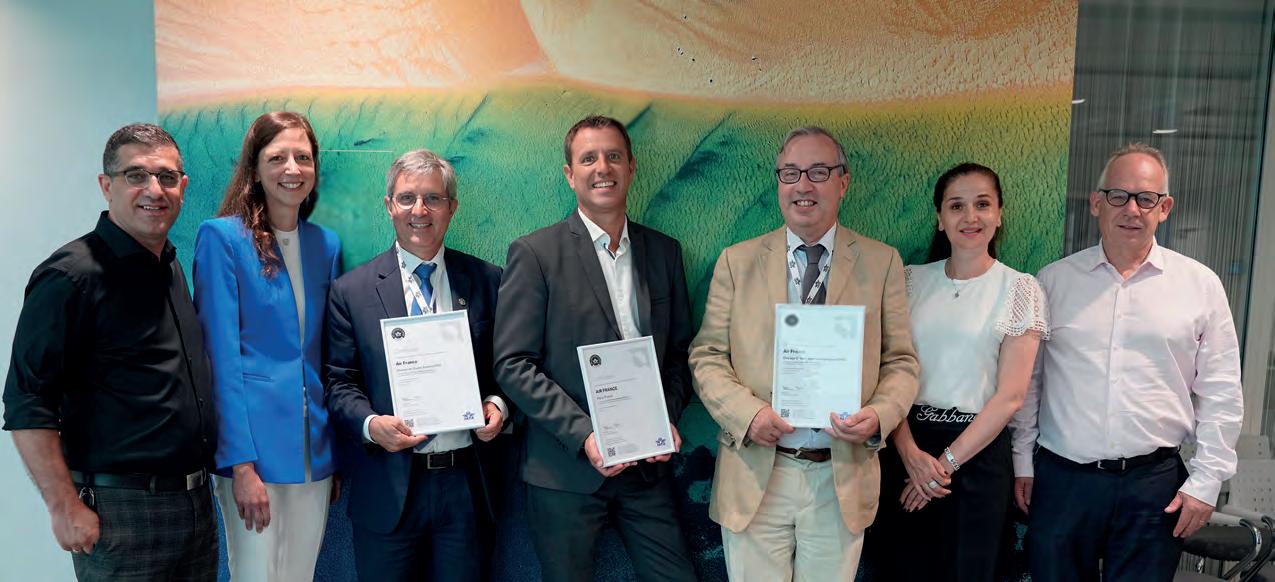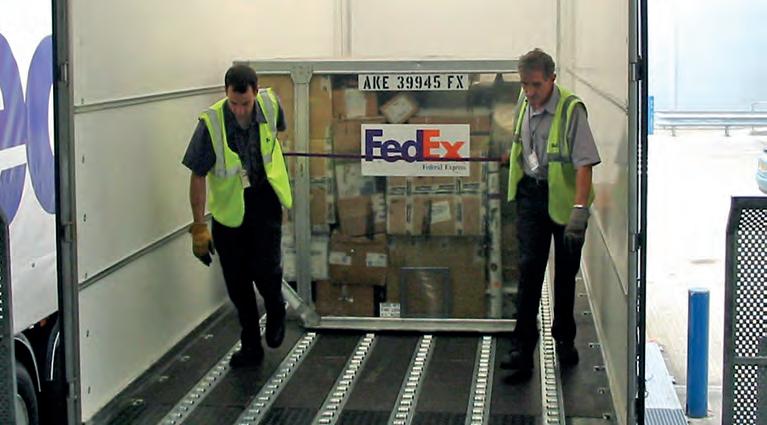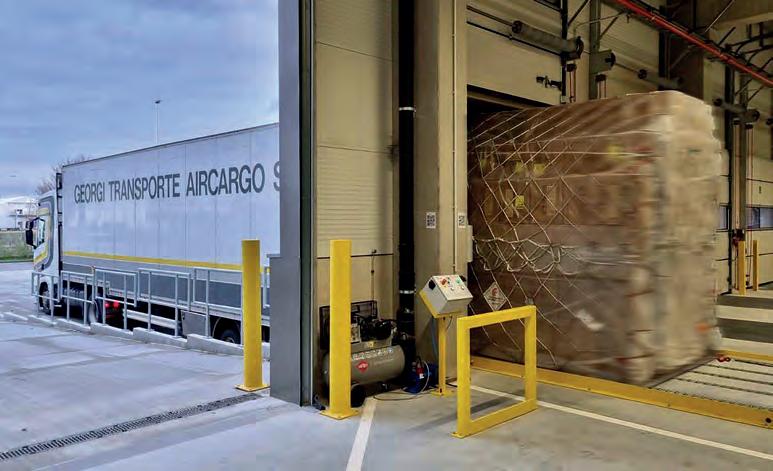
























The weekly newspaper for air cargo professionals



No. 1,241 31 July 2023





























No. 1,241 31 July 2023
PROPELLING DIGITAL SALES ...


IN a move to accelerate its digital transformation and expand its reach in the global air cargo market, Eastern Air Logistics has chosen ...
PAGE 2
COLLABORATION CREATES ...
DIGITAL innovation is taking centre stage, revolutionising the way the air freight industry operates and interacts with customers. At the forefront ...

PAGE 3
Air France KLM Martinair Cargo has announced the successful attainment of the IATA Centre of Excellence for Independent Validators Lithium Batteries (CEIV Li- batt) certification for Air France Cargo and its hubs at Paris Charles de Gaulle and Chicago O’Hare.

Safety is a top priority at Air France KLM Martinair Cargo (AFKLMP Cargo), ensuring the best possible transportation of dangerous goods, such as lithium batteries, which are increasingly in demand.

On 11th July, Christophe Boucher, EVP of Air France Cargo, visited the IATA offices in Geneva to accept the much sought-after lithium battery certification for Air France Cargo and its hubs at Paris Charles de Gaulle and Chicago O’Hare. Certification is preceded by a strict assessment, which not only confirms an organisation’s commitment to upholding the highest safety standards, but also ensures the safety of employees and operations by continually improving and maintaining standards.
“We are very proud of this certification that proves that Air France KLM Martinair Cargo applies the highest industry standard with regards to the handling of lithium batteries. We keep on working on the different aspects of the handling and transportation of such shipments in order to ensure the maximum level of safety to our passenger and cargo customers,” Christophe Boucher, EVP of Air France Cargo, said.
The certification programme of the Centre of Excellence for Independent Validators Lithium Batteries (CEIV Li-batt) is specifically designed to enable
shippers, freight forwarders, cargo handling facilities and airlines to fulfil their safety obligations by complying with regulations for transporting lithium batteries.
“We congratulate Air France KLM Martinair Cargo on achieving CEIV Lithium Battery Certification. Lithium batteries are critical power sources for many consumer goods and it is vital that we can ship them safely by air either with finished products or as components in global supply chains. That’s why we developed the CEIV Lithium Battery certification. It gives their shippers the assurance that they are operating to the highest safety and security standards when shipping lithium batteries,” Frederic Leger, IATA Senior Vice President Commercial Products and Services, added. Nowadays, these batteries are the preferred power source for mobile phones, children’s toys, cars, e-bikes and a wide array of other consumer goods. Many people are unaware, however, that lithium batteries are dangerous goods that can pose safety risks if not handled in accordance with transport regulations.
The CEIV Li-batt certification programme is based on IATA Dangerous Goods Regulations (DGR) and IATA Lithium Battery Shipping Regulations (LBSR). The programme aims to set standards by raising competency levels and quality management in the handling and transport of lithium batteries throughout the supply chain. IATA certifies organisations that complete the required training, assessment and validation procedures, listing them in the IATA ONE Source registry on compliance with programme standards.
STREAMLINING SYSTEMS WITH ... RECOGNISING the potential of technological innovation, HAE Group has taken steps towards digitalising its cargo operations with the introduction of ...
PAGE 4
TELEPORT STRENGTHENS ...
WESTJET Cargo and Wiremind have embarked on an innovative initiative to enhance the airline’s capacity forecasting process
PAGE 8
Page 6
IN a move to accelerate its digital transformation and expand its reach in the global air cargo market, Eastern Air Logistics has chosen cargo.one as its digital distribution partner. The partnership aims to leverage cargo.one’s expertise and advanced platform to streamline the digital sales process, offering freight forwarders seamless access to capacity on Eastern Air Logistics flights.
“These are our first steps into digital sales which makes partnering with the most globally relevant and experienced channel all the more important,” Jonathan Xu, General Manager of Logistics Solutions Business Department at Eastern Air Logistics, said.
Chinese carriers have been making strides in digitizing their sales processes, and Eastern Air Logistics stands at the forefront of this transformation. Cargo.one, known for connecting global air cargo and providing innovative digital solutions, recognizes the potential in partnering with a major cargo carrier in and out of China.
“At cargo.one, our goal has always been to connect global air cargo. Over the past years, we have partnered with more than 5000 forwarding branches and over 40 airlines, to make this vision come true,” Moritz Claussen, Founder and Co-CEO of cargo.one, added.

The collaboration is rooted in mutual admiration, as Eastern Air Logistics acknowledged cargo.one’s track record and a global network of more than 15,000 forwarders. Meanwhile,
cargo.one was impressed by Eastern Air Logistics’ commitment to digital excellence and its ambition to become the most innovative integrated logistics service provider.
“Based on our own digital blueprint, cargo.one stood out as an established, best in class and intuitive digital sales partner,” Xu stated. “With over 40 airline partners onboard already, it was clear that we would benefit from the strength of cargo. one’s insights, its proactive partnership support and access to its valuable best practices for digital sales.”
“China is one of the single most significant air cargo markets - naturally, partnering with major cargo carriers in and out of China, such as with Eastern Air Logistics, is yet another significant step towards a digital future,” Claussen continued.
Since the inception of the partnership, both companies have worked closely to ensure a smooth and successful integration of their digital sales platforms. Eastern Air Logistics’ digital sales platform, EOS, laid the foundation for the collaboration, enhancing the carrier’s capabilities for digital sales. The collaboration with cargo.one has allowed Eastern Air Logistics to offer high-quality services and optimize the digital buying journey for customers worldwide.
“We’ve enjoyed a very close collaboration with cargo.one over the past months,” Xu explained. “Our teams work closely to ensure that we are delivering the right offer quality, and we are building the best digital buying journeys optimized for customers around the world.”
“Some freight forwarders in the West may still believe that digital booking of Chinese capacity new to them could require heavy lifting with administration and systems,” Claussen added. “It is important that they revisit this opportunity, because cargo.one is a clear example of how easy and efficient digital booking now is for a great many shipments involving China.”
With digital sales becoming a strong pillar of Eastern Air Logistics’ overall digital transformation, the carrier aspires to expand its digital reach rapidly and cater to a diverse range of online customer needs. Leveraging cargo.one’s insights and best practices, Eastern Air Logistics aims to identify untapped market opportunities and elevate its revenue and capacity management strategies.
agents to expand their business and reach new markets. Asia’s carriers, including Eastern Air Logistics, have been making significant strides in embracing digital sales. While Asia was initially slower in adopting digital air cargo booking compared to Europe and North America, East Asia is now rapidly closing the learning gaps and experiencing remarkable growth. This trend has positioned the Asia Pacific region as the fastest-growing market for cargo.one globally.
Looking ahead, Eastern Air Logistics and cargo.one anticipate substantial gains from their digital sales capabilities in the coming year. The collaboration promises increased awareness and convenience for customers, making Eastern Air Logistics a preferred choice among forwarders seeking efficient and transparent air transportation.
In addition to strengthening their partnership, both companies remain committed to bolstering the Chinese air cargo market’s growth through digitization. Digital booking, facilitated by cargo.one’s advanced technology and infrastructure, is expected to play a vital role in scaling the industry further in the region.
“Digital connections will provide increased awareness and convenience for customers. As a result, we expect to be discovered and preferred by many new agents, and so win share from other less accessible carriers,” Xu said. cargo.one is reaffirming its focus on the Asia Pacific region, fortifying its commitment to providing maximum digitalization benefits for customers and partners. Working closely with major Chinese carriers like Eastern Air Logistics is set to accelerate the development and implementation of cutting-edge digital solutions.
“Currently, Asia Pacific is our highest growth customer market. The depth and diversity of our supply, and a product that forwarders in all markets love to use has provided Chinese agents with a great opportunity to thrive with digital bookings,” Claussen highlighted.
“We believe air transportation digitization will open up new opportunities for growth and more possibilities. Also, we are willing to explore more opportunities in the broader market with a positive attitude,” Xu continued.
Tim Brocklehurst
Directors: Norman Bamford • Dawn Jolley
“Digital sales is giving us exciting new opportunities to evolve and expand as a logistics brand globally - cargo.one is now an integral part of ensuring that we remain front of mind with forwarders in all the most relevant markets,” Xu stated.
Freight forwarders in China are increasingly exploring digital booking options, with cargo.one pro proving to be a particularly attractive proposition. This seamless and efficient digital booking process opens doors to a vast global network of forwarding companies in 90 countries, empowering Chinese
For freight forwarders in markets like North America and Europe, the partnership between Eastern Air Logistics and cargo.one opens new opportunities to explore Chinese airlines’ capacity. The ease and efficiency of digital booking with cargo. one dispels misconceptions about administrative burdens, providing seamless access to capacity within China.
“In particular, digital agent-to-agent bookings with cargo.one pro are proving a very attractive proposition for forwarders in Asia to win new business around the clock,” Claussen said. “For example, Chinese agents are keen to expand their business within our global community of forwarding companies in 90 countries, with importers in Europe and USA of particular interest.”

You don’t need us to point out how extraordinary and turbulent the last few years have been in the air cargo industry. What with the increased flows of PPE and other medical materials, and record-breaking levels of global e-commerce trade, all combined with a shortage of ground staff.

But you may need us to introduce you to Joloda Hydraroll, a global provider of loading and unloading solutions. Joloda Hydraroll can design, manufacture, install and maintain specialist loading systems to solve businesses’ unique loading and unloading challenges. The company creates solutions that integrate seamlessly to provide unparalleled, long-term benefits.
Founded in 1962, Joloda Hydraroll has been providing businesses with loading solutions for more than 60 years – that’s over half a million systems worldwide. Its highly skilled team is over 250 strong, and through extensive knowledge and expertise, its goal is to inspire change and make loading efficient, sustainable, cost-effective and safe.

When it comes to the air cargo industry, Joloda Hydraroll has almost 45 years of experience. It can provide a complete handling solution, from truck to warehouse, for air cargo equipment such as PMC pallets and ULDs.


The traditional method of unloading ULDs is to pull them from the truck with winches, but this can be a slow and risky process due to the weight and size of the containers. It can also cause damage to the cargo or to the warehouse floor. The Modular Rollerbed System (MRS) helps Road Feeder Service companies load and unload their trucks and dissemble cargo in warehouses quickly, efficiently and safely.
The MRS system can now be specified with a newly-developed Powered Cargo Roller (PCR) system, which is just 70mm high, making it now even easier to get a PCR trailer in operation. No more special trailer designs, simply specify and retrofit a MRS system with PCR into a standard trailer.
MRS modules or MRS with PCR modules arrive on-site pre-assembled and ready to install in your workshop (or by your trusted bodybuilders) within a couple of days. The beauty of the modular system is that when it comes to fleet renewal, the system can be removed and reinstalled, too.
Whilst the MRS system was primarily developed and used for use in trailers, it can also be retrofitted into warehouses, too, turning any warehouse into a temporary air cargo handling station. Operators can roll a full trailer’s worth of air cargo out of a truck with the push of a button and onto a warehouse’s rollerbed floor. From here, cargo can be rolled into the warehouse for dismantling with ease.
According to Boeing’s forecast, the freighter fleet is expected to increase by 80 per cent by 2041 compared to the 2019 fleet, highlighting the need for faster and more efficient air cargo handling solutions.
Wouter Satijn, Joloda Hydraroll’s Sales Director, has expressed confidence that the company’s innovative, high-quality loading and unloading solutions and combined expertise will offer a service that can’t be matched. “Bringing our portfolio of solutions together will enable air cargo companies to unlock greater value and efficiency from an increasingly complex global supply chain,” he said.
DIGITAL innovation is taking centre stage, revolutionising the way the air freight industry operates and interacts with customers. At the forefront of this technological transformation is CargoTech, an umbrella group consisting of: Rotate, Wiremind, CargoAi, ECS’s Cargo Digital Factory and newcomer CharterSync. Together, they are driving the adoption of digital solutions and promoting the benefits of technological advancements in the industry.
When engaging with customers, CargoTech recognises that different companies have varying needs and digital maturity levels. Advanced carriers typically seek revenue optimisation products to increase or safeguard their earnings. To cater to these requirements, CargoTech’s member companies offer solutions such as Rotate’s Sales Cockpit, Wiremind Cargo’s capacity forecasting and revenue optimisation tools, CargoAI’s marketplace, which promotes sales channels for smaller and medium-sized forwarders and CharterSync’s innovative solutions to streamline air cargo charter processes. By addressing specific needs, CargoTech ensures that their customers receive the most relevant and beneficial digital solutions.
“That’s why we created CargoTech, with a combination of different companies that could develop complementary products,” Cedric Millet, President of CargoTech, said. “CargoTech offers a wide range of products from all of our members, meeting the specific needs of our customers.”

To promote their offerings effectively, CargoTech utilises multiple strategies. One approach is signing partnerships and collaborations with major players in the air freight sector. For example, CargoTech’s member Rotate recently announced a strategic partnership with Etihad Cargo and Qatar Cargo teamed up with Wiremind Cargo, moves that not only enhances their visibility but reflects the effectiveness of their all-in one solution.
“We are bringing a digital solution. We are digitalised, which is when you improve manual processes to focus on valueadded revenue-generating elements,” Millet explained. “You’re keeping the traditional way of working but you’re giving the people a tool that will make them make more informed decisions.”
One of the key strengths of CargoTech is the collaboration among its member companies. Instead of competing against each other, they develop complementary products and coordinate their roadmaps to avoid duplication. This collaborative approach allows CargoTech to offer a comprehensive package of solutions to customers, combining the expertise of cargo industry veterans with technology specialists. This unique combination ensures that the solutions provided not only leverage cutting-edge technology but also align with the intricate intricacies of the air freight industry.
“We have created that kind of umbrella that gathers different companies that have different offerings. Millet, explained. “Within CargoTech, we are trying to have companies that do not overlap, so they are complementing each other and coordinating on their roadmap.”
The success of CargoTech’s collaborative model highlights the potential benefits of a similar approach across the industry. By encouraging collaboration and synergy among technology companies, the airfreight sector as a whole can experience accelerated growth and enhanced innovation.
“You have a lot of companies today in the sector that are providing cargo solutions but do not have a clue about the cargo business itself, so they’re looking at concepts they think the industry wants without providing what customers need,” Millet said. “We have about 70 people, 25 are cargo experts and the rest are technology experts, providing a good combination.”
While healthy competition is acknowledged, CargoTech believes that their holistic approach, offering complementary products developed by cargo and technology experts, sets them apart and makes a significant impact on the industry.
When it comes to the balance between digital innovation and traditional practices, CargoTech adopts a pragmatic approach. They do not aim to eliminate traditional processes entirely but rather focus on digitising manual tasks that can be automated, freeing up time for employees to concentrate on more valuable, revenue-generating activities. By providing decision support tools and digital solutions, CargoTech empowers individuals to

make more informed decisions while preserving the traditional workflow.
“It starts with the customer’s needs. If the customer needs just 10% of our package, we can tailor it to offer the solution that really meets their needs,” Millet stated. “If they don’t know what they need, we can offer consultancy services to help tailor it to their preferences.”
CargoTech’s commitment to driving digital innovation in the air freight industry is evident through their comprehensive product portfolio, collaborative approach, and customerfocused strategies. By combining cargo industry expertise with cutting-edge technology, CargoTech is keen to shape the future of air freight and continue delivering solutions that optimise operations, increase revenue, and meet the evolving needs of customers in this dynamic industry.
“We can always find a solution but the selling point is we believe that we provide the right or relevant solution to a specific process. We are providing solutions that have been designed by people who know the business and can develop the latest technology,”
RECOGNISING the potential of technological innovation, HAE Group has taken steps towards digitalising its cargo operations with the introduction of cutting-edge solutions. By leveraging their Webportal and Quote Management System (QMS), HAE Group has transformed the way freight forwarding customers and airline partners interact, enabling real-time engagement, enhanced security, and streamlined processes.
HAE Group’s Webportal seamlessly integrates with carrier systems through API connections and industry-standard protocols, including SITA messaging. This integration allows freight forwarding customers to access a range of benefits, including a personalised login, branded quotations from airlines, the ability to request spot rates, and confirm acceptance of quotes and terms and conditions. The Webportal facilitates efficient communication and collaboration between HAE Group and its customers, enabling swift and accurate response times.
“HAE’s QMS system is able to connect to it’s carriers system via API and other formatted industry protocols, including SITA messaging to request rates, approve spot rates and make bookings,” Neville Karai, CEO of HAE Group, explained.

The integrated CRM ensures effective collaboration between field sales and inside teams, facilitating new business development. The platform’s efficient quoting process, coupled with swift rate approval and availability confirmation, enables faster response times to customer inquiries.
HAE Group prioritises security in its webbased solution. Access to the system is tightly controlled through registered accounts, requiring acceptance of terms and conditions on behalf of the carrier and service providers. These measures ensure that data remains protected, providing peace of mind to all stakeholders involved.
“It is a cloud based system, where security is paramount, the system is compliant with all legislation in all the countries it is used in,” Karai
continued.
HAE Group’s bespoke QMS system enables realtime interaction and faster response times to inquiries. Through a workflow-driven process, customers can request quotes, receive accurate rates from carriers, and confirm bookings efficiently.
“The speed of the quote is one of our USPs and also our ability to automatically book and send the confirmation to the customer once they have agreed the rate,” Karai said.
HAE Group’s Quote Management System (QMS) empowers airlines and clients with improved real-time interaction for quotes and bookings. Customers can request quotes via QMS or email, which are then cross-checked manually for accuracy. The system’s workflow streamlines the process of obtaining rates from carriers and facilitates seamless communication with customers. The QMS also enables counteroffers and automates the booking process, providing quick confirmation to customers once they agree to the rates.
HAE Group’s investment in technology has enabled its teams to adapt easily to remote work, ensuring business continuity for clients and airline partners.
“We are paperless and by defining the workflow we can break the functions of the workflow to teams around the world. So we can sell in country and process the operational functionality anywhere in the world. This gives us the ability to support our carriers and our customers 7 days a week,” Karai added.
Recognising the industry’s disruptions, HAE Group has developed new solutions and products to meet the evolving requirements of its GSA (General Sales Agent) clients. In addition to its GSA airline cargo export services, HAE Group now offers imports, cross-trade, and express services.
“This is intended to give our airline partners increased market share in their market and our customers more options to use those services,” he said.
HAE Group’s approach focuses on meeting the core requirements of its freight forwarding client base. Customers increasingly seek more options to remain competitive in the market. By leveraging their GSA representation and market expertise, HAE Group offers tailored solutions that help customers stay ahead of their competitors.

“Our aim is to continue with the connectivity to our airline partners and offer our forwarding customers access to the platform. We need to continue to make it faster and easier to use,” Karai added.
HAE Group leverages data and technology to ensure business continuity and provide access to a full suite of airline products and solutions.
HAE Group’s investment in best-in-class IT systems plays a crucial role in providing a GSSA+ experience for airlines and customers. Their self-developed software connects them to airline partners, while their customer login feature offers customers easy access to the platform. HAE Group’s continuous efforts to make the system faster, more user-friendly and enhance overall operational efficiency for their customers.
By subscribing to industry data sources and closely collaborating with carriers, HAE Group stays updated on market dynamics and new product offerings. This enables them to deliver optimal solutions to their clients and airline partners.
“In 2023, we continued our expansion of new offices in Egypt, Italy and China, all on the same QMS system. We will roll out our customer login into the rest of the network and add more services to the platform,” Karai stated.

IN an industry as complex and dynamic as freight forwarding, streamlining operations and improving efficiency are paramount for success. Raft, a technology-driven company, is making significant strides in transforming the shipping landscape. By harnessing the power of artificial intelligence (AI) and machine learning (ML), Raft aims to automate and optimise operations for freight forwarders, customs brokers, and other stakeholders in the shipping ecosystem.
With a focus on document extraction, data integration, and workflow automation, Raft offers tailor-made solutions that alleviate manual processes and empower organisations to enhance their productivity and customer service.
Lionel van der Walt, Raft’s Chief Growth Officer, said, “Establishing workflows that can automate processes and tackle, not only data entry, but all the manual time-consuming processes, really saves a lot of time.”
Raft’s product offerings span the entire shipping lifecycle, encompassing areas such as finance, operations, sales, and customer service. Their foundational element lies in document extraction, enabling seamless data extraction from various documents critical to shipping operations. By integrating this extracted data into transportation management systems (TMS), Raft establishes efficient workflows that automate processes and minimise manual data entry.
One of the standout benefits of Raft’s technology is its ability to address pain points within the industry. For instance, in the accounts payable realm, Raft’s platform enables instant access to the job costing owner when discrepancies arise, eliminating the need for time-consuming searches. By connecting stakeholders directly through their system, Raft reduces response times and saves valuable resources.
Raft’s technology not only streamlines operations but also caters to the growing demand for sustainability and digitisation within the freight forwarding industry. The market’s increasing competitiveness and the need to stay ahead of regulatory requirements are driving companies to adopt digital strategies.
“I think there’s a lot of companies that are being very responsible and they want to position themselves as such. There are others that don’t, who are going to be forced by those external pressures to adopt sustainable practices,” he said.
Raft recognises that technology should complement human efforts rather than replace them. They embrace a human-in-theloop approach to AI and ML, empowering staff to focus on core activities and customer service while leveraging technology to automate time-consuming tasks. By utilising technology to scale operations and improve efficiency, companies can lower costs, drive sustainability initiatives, and attract young talent to the industry.
“Especially with the market where it is today. The market is depressed and getting tougher for freight forwarders,” van der Walt added. “What we’re trying to do is use the technology to assist staff to be able to focus on their core activities versus just data entry.”
Sustainability has emerged as a significant focus area for the freight forwarding industry. While progress has been slow, companies like Raft are witnessing a shift towards a more sustainable approach. European corporate sustainability reporting directives set to take effect in 2024 will impact freight forwarders, requiring verifiable data on logistics upstream and downstream.

“I think the thing that’s going to catch people out is the new European corporate sustainability reporting directive. That is going to impact some forwarders directly, especially if they’re listed in Europe,” van der Walt highlighted.
The compliance requirements from major listed companies will cascade down to forwarders globally. To avoid being caught off guard, companies must start implementing the right technology now to gather and report the necessary data. Sustainability initiatives are becoming a critical aspect of a company’s reputation, investor relations, and partnerships, driving the adoption of digital

“Everybody’s looking at technological solutions that can help them to digitalise, so that really accelerated things”
solutions that facilitate sustainability reporting.
“If you do not start looking at it now and getting the right technology in place to be able to have that data and report it in the right manner, you’re going to be in hot water,” van der Walt warned.
Technological resistance
Freight forwarding has traditionally exhibited resistance to technology adoption, often due to concerns surrounding change and the unfamiliarity of technological solutions. However, Raft’s experience suggests that resistance diminishes when the value proposition is clear.
“People are looking at us and saying ‘if we’re going to grow our business, we’re in a tough market, how do we do that without adding additional cost’,” van der Walt explained. “You can start using technology to do that. It’s about helping people to scale and lower costs, driving more efficiency.”
“With Covid came a big push,” van der Walt continued. “Everybody’s looking at technological solutions that can help them to digitalise, so that really accelerated things.”
By offering user-friendly platforms with intuitive interfaces and providing education about the benefits, Raft ensures that their technology adds value to users’ daily routines. Furthermore, the influx of younger generations into the industry, attracted by the advancements in technology, is bridging the gap and facilitating the adoption of innovative solutions.

“The technology is there. It’s not something for the future. It’s there today and people are using it,” van der Walt stated. “All the major players are using it, and a lot of smaller guys are now starting to use it. So, it’s right across the spectrum.”
In an industry where supply chains are intricate and involve multiple stakeholders, digital strategy plays a crucial role in ensuring transparency and efficiency throughout the entire process. Raft emphasises the need for a comprehensive digital strategy to meet upcoming regulatory requirements and enable transparent reporting. From verifiable data collection to detailed reporting, companies must adopt technology platforms that facilitate accurate and meaningful reporting to align with evolving
regulations and investor expectations.
“Our strength being a company that works around data is that we can help and really find all the data points as required,” van der Walt said. “It’s about getting the data in the right sequence, with nothing missing, in the format that’s required for the emissions calculation companies.”
As the digital landscape in freight forwarding becomes increasingly competitive, Raft maintains its edge through continuous learning and collaboration with customers. By listening to customer feedback and tailoring solutions to their specific needs, Raft ensures that its platform remains unique in the market.
“We are continuously learning and evolving as a company. We spend a lot of time listening to our customers to learn about the key challenges they are facing,” van der Walt added. “We have the right team in place to support our growth and the growth of our customers.”

“If you do not start looking at it now and getting the right technology in place to be able to have that data and report it in the right manner, you’re going to be in hot water”
WESTJET Cargo and Wiremind have embarked on an innovative initiative to enhance the airline’s capacity forecasting process. By leveraging Wiremind’s expertise in data science and machine learning, the partnership aims to improve accuracy in predicting cargo capacity for sale.
The initiative between WestJet Cargo and Wiremind centers around a Proof of Concept (PoC) to explore how Wiremind can support WestJet Cargo’s capacity forecasting process. By examining data and testing it in Wiremind’s existing capacity forecasting solution, the partnership aims to assess the performance and accuracy of predicting cargo capacity for sale.
“The more accurate the forecast or process is, the better the business impact in terms of maximizing capacity available for sale or reducing the number of unfavourable outcomes,” Nathanel de Tarade, CEO of Wiremind Cargo, said.

“Intelligent digital support is invaluable for WestJet Cargo as it considers variables like weight, volumes, and pieces during pre-flight preparations, enabling accurate assessment of cargo capacity,” Kirsten de Bruijn, WestJet Cargo’s Executive Vice President, said. Wiremind’s capacity forecasting solution considers various factors when estimating the remaining cargo capacity for sale. It leverages historical flight data, baggage numbers, fuel consumption, and forward-looking passenger forecasts. By reviewing data at granular levels such as booking class or specific aircraft registration, the solution provides precise and accurate forecasts for cargo capacity.

The decision to explore capacity forecasting
improvements was prompted by the SKYPALLET contract renewal with Wiremind. Recognising capacity forecasting as a critical pain point for many airlines, Wiremind was already developing its capacity forecasting solution as part of its CARGOSTACK Optimiser portfolio.
“We were thrilled to be able to implement this with our existing customer WestJet Cargo, with whom we have a longstanding relationship and we were keen to learn from them,” de Tarade stated.

The PoC for capacity forecasting discussions with WestJet Cargo began in April 2023, with initial discovery calls to understand their current revenue management processes. The focus quickly shifted to addressing the specific pain point of capacity forecasting. The outcome of the PoC is expected to be determined in the coming months, with implementation likely toward the end of 2023.
Wiremind’s optimisation solution, CARGOSTACK Optimiser, utilises Artificial Intelligence (AI) to enhance capacity forecasting. Powered by tailored and proprietary machine learning models, the solution predicts patterns of behaviour in the underlying data sets. For capacity forecasting, machine learning models are used to predict baggage and payload based on historical data, expected passenger numbers, and other influencing factors such as fuel and weather.
“By leveraging the advancements in machine learning and AI, WestJet Cargo can optimise cargo offerings and enhance operational efficiency. The evolving digital landscape presents transformative opportunities for the air cargo industry, allowing WestJet Cargo to thrive in this dynamic environment,” she continued. “The transformative impacts we anticipate are just the beginning as these technologies continue to advance and reshape our industry.” Wiremind’s capacity estimates can be provided in terms of payload and volume, depending on the flight profile or aircraft type. For payload-constrained routes, payload recommendations are particularly important, while volume recommendations are provided for wide-body and narrow-body flights, considering loose-loaded cargo and baggage.
Wiremind’s capacity forecasting solution aims to address the unpredictability faced by cargo teams at passenger-heavy airlines. The complexities of cargo capacity determination, often only known shortly before departure, pose significant challenges.
“This is particularly the case for cargo teams of passenger airlines, where baggage in particular can consume considerable portions of the belly hold of an aircraft,” de Tarade highlighted.
The solution improves predictability by accounting for various capacity-consuming items, such as passenger baggage, weight, and fuel, resulting in better cargo space utilisation and operational efficiency.
“We have been especially excited to see the more recent developments WestJet Cargo has undertaken such as the addition of new freighters, which shows their commitment to cargo, and the expansion of their cargo team, with whom we have had some very insightful conversations,” de Tarade said. “This means that we are very positive about what the future holds for our partnership with WestJet Cargo.”